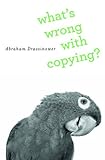What's wrong with copying? /Abraham Drassinower.
Material type: TextPublication details: Cambridge, Massachusetts : Harvard University Press, (c)2015.Description: 1 online resource (xi, 272 pages)Content type:
TextPublication details: Cambridge, Massachusetts : Harvard University Press, (c)2015.Description: 1 online resource (xi, 272 pages)Content type: - text
- computer
- online resource
- 9780674286566
- K1447 .W438 2015
- COPYRIGHT NOT covered - Click this link to request copyright permission: https://lib.ciu.edu/copyright-request-form
| Item type | Current library | Collection | Call number | URL | Status | Date due | Barcode | |
|---|---|---|---|---|---|---|---|---|
 Online Book (LOGIN USING YOUR MY CIU LOGIN AND PASSWORD)
Online Book (LOGIN USING YOUR MY CIU LOGIN AND PASSWORD)
|
G. Allen Fleece Library ONLINE | Non-fiction | K1447.15 (Browse shelf(Opens below)) | Link to resource | Available | ocn908192409 |
Browsing G. Allen Fleece Library shelves, Shelving location: ONLINE, Collection: Non-fiction Close shelf browser (Hides shelf browser)
Includes bibliographies and index.
Introduction: the horror of the copy -- The poverty of value -- Originality as speaking in one's own words -- The work as a work -- Infringement as compelled speech -- The public domain as dialogue -- Copyright and the system of rights -- A note on copyright citizenship.
"Copyright law, as conventionally understood, serves the public interest by regulating the production and dissemination of works of authorship, though it recognizes that the requirements of the public interest are in tension. Incentives for creation must be provided, but protections granted authors must not prevent the fruits of creativity and knowledge from spreading. Copyright law, therefore, should balance the needs of creators and users--or so the theory goes. Challenging this widely accepted view, What's Wrong with Copying? disentangles copyright theory from its focus on the economic value of an authored work as a commodity or piece of property. In his analysis of copyright doctrine, Abraham Drassinower frames an author's work as a communicative act and asserts that copyright infringement is best understood as an unauthorized appropriation of another person's speech. According to this interpretation, copyright doctrine does not guarantee an author's absolute rights over a work but only such rights as are consistent with both the nature of the work as speech and with the structure of the dialogue in which it participates. The rights protecting works of authorship are confined to communicative uses of the work and to uses consistent with the communicative rights of others--for example, unauthorized reproduction of a work is lawful when responding to the work requires its reproduction. What's Wrong with Copying? offers a new way to interpret and criticize existing copyright law and to think about the relation between copyright and digital technology as well as broader juridical, social, and cultural concerns."--Publisher's description.
COPYRIGHT NOT covered - Click this link to request copyright permission:
There are no comments on this title.







